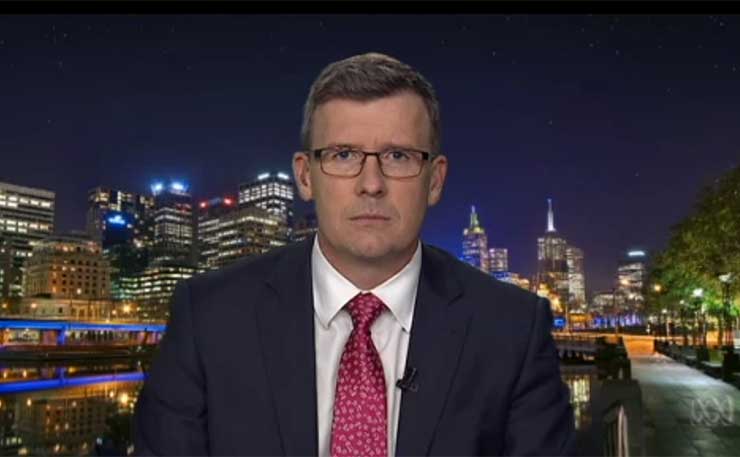Senate Estimates hearings revealed the scope of Centrelink’s overreach, writes Ben Eltham.
The ritual of Senate Estimates is one of Parliament’s great rites, and one of Australian democracy’s most important institutions.
The power of the Senate to force government officers to front up and answer questions from lawmakers is one of the last and best accountability mechanisms of Australian public life.
Estimates can often be boring, as senators plough their way through the progress of this or that infrastructure program or service delivery roll-out. But every so often, it produces gripping scenes.
That was the case yesterday in the Senate’s Community Affairs committee, where the Secretary of the Department of Human Services, Kathryn Campbell, was called upon to give evidence.
Campbell, a Labor appointee, is a career bureaucrat and part-time soldier. She worked her way up as a top mandarin in the Department of Finance before becoming Secretary of the Department of Human Services in 2011.
All the while, she has also pursued a parallel career in the Australian Defence Force. She is the ADF’s first female brigadier, commanding the 5th Brigade of the Army Reserve. In 2016, she deployed to the United Arab Emirates as second-in-command of Australia’s forces in the Middle East.
Brigadier Campbell makes no secret of the influence her military career has on her duties as a public servant. “I’ve found it very useful in my public service career to have that leadership and command training that the military provides, to always see people as a key determinant of achieving objectives,’’ she told The Australian’s Brendan Nicholson in August last year.

“To provide leadership to the department, I think the skills I learned in the military have been incredibly important,” she added.
Campbell’s military demeanour and leadership skills were very much on display at Senate Estimates yesterday – though perhaps not in the way that she might have imagined in her friendly interview with The Australian.
That’s because Campbell is now at the centre of one of the most serious scandals in the Australian Public Service since the notorious “children overboard” testimony of Jane Halton in the early 2000s.
As Secretary of the Department that oversees Centrelink, Campbell is the top bureaucrat in charge of a government agency in crisis. Centrelink has gone rogue, destroying lives and ruining reputations. The controversy may do more than damage careers: it may land Campbell and her Minister, Liberal MP Alan Tudge, in deep legal trouble.
According to Labor and at least two legal academics with experience in social security law, Campbell and Tudge may well have broken the law when they decided to release the private tax and welfare data of blogger and economist Andie Fox to Fairfax journalist Paul Malone.
New Matilda investigated the intentional disclosure this week. Fox had written a widely-shared article detailing her difficult experience navigating Centrelink’s bureaucratic maze.
In response, Minister Tudge and his Secretary Campbell ordered the release of Fox’s private information to a journalist. They continue to claim it was for the express purpose of “correcting the record”. Others ask whether it was in fact about attacking a critic and silencing dissent.
Campbell’s performance in Estimates yesterday was calm and controlled. But the things that she said were astonishing. In measured terms, she described an official program of social media surveillance, in which Centrelink monitors social media for critics, and sends private information about those critics to the Minister’s office.

Campbell also described an interpretation of social security law so broad that it effectively adds up to a license for the Department to disclose information against any citizen criticising government policy.
Amongst the things we learned from Campbell’s explosive Estimates testimony yesterday were:
- the Department of Human Services monitors mainstream and social media for criticism, and sends private information about the welfare files of critics to the Minister’s office.
- In response to enquiries from Fairfax journalist Paul Malone, the Minister and the Department pulled Andie Fox’s file and prepared information for release without her consent.
- the Department believes that releasing private information about a critic is justified in order to maintain public confidence in the integrity of the social security system.
- despite this, Centrelink keeps no aggregate figures on the number of mistakes it makes, and cannot provide data on the percentage of robo-debt notices that is sending in error.
- the Department believes it can disclose private data on individuals from other government agencies such as the Australian Tax Office.
- the Department is relying on an interpretation of social security law that is so broad that it effectively means any public critic of welfare policy could have their private information disclosed.
Campbell’s reading of the Social Security (Administration) Act 1999 is particularly relevant. If adopted across the rest of government, it would appear to amount to a blank cheque to release data against almost anyone speaking publicly about government policy.
The Department advanced the line that, because Andie Fox had written an article explaining how hard it was to deal with Centrelink, it was completely justified in deliberately releasing her file to a journalist.
“The recipient had made a number of claims that were unfounded and it is the opinion of officers that this was likely to concern other individuals,” Campbell said yesterday.
“That’s why we felt that it was appropriate to release the information, so that people knew it was important to file their tax returns and tell us about changes in their circumstances,” she continued.
It’s worth lingering over this breathtaking remark from the Secretary of the Department of Human Services. Campbell said it was appropriate to disclose the private data of a citizen in order to remind the public to file their tax returns! This is government overreach as Orwellian as it is frightening.
The legalities of the matter are complex, but it boils down to a sweeping new interpretation of the Social Security (Administration) Act. Secretary Campbell could have sought a so-called “public interest certificate”, the normal way the Department would legally release private information. But she didn’t do so.
Instead the Department relied on a different section of the law, section 202, and a tortuous interpretation that claims that releasing data is permissible in order to “to maintain public confidence in the administration of the law”.
According to La Trobe University legal scholar Darren O’Donovan, this amounts to broad new powers with huge implications for privacy. “If they were permitted to use it [in]that manner it would have very broad consequences for Australian privacy protection,” he told us in an email.

It was an extraordinary day. Yesterday we learned via the Guardian that Minister Alan Tudge’s office had sent Paul Malone two official briefing documents marked “for official use only”, containing sensitive information from Fox’s file. According to the Guardian’s Christopher Knaus, “they included further detail of her relationship history, including when she separated from her partner”.
If you are concerned about what this says about the security of personal data held by the government, you are not alone. Both Labor and the Greens are deeply worried about the development, and social media has been running hot.
Late yesterday, Labor’s human services spokesperson Linda Burney referred Alan Tudge and his office staff to the Australian Federal Police.
“What was revealed today (Thursday) in Senate Estimates was shocking,” Burney told journalists.
“The private information of an individual who went to a government instrumentality appears to have been provided to a media outlet without her permission. If this is the case, then how can we trust this Government to look after anyone’s private information?”
Perhaps the most ironic aspect of Campbell’s Estimates testimony yesterday was her insistence that releasing the data about Fox was necessary to maintain public confidence in Centrelink.
For anyone caught in the tentacles of Centrelink’s robo-debt disaster, that remark will seem like a bad joke.
As lawyers and civil liberties advocates have pointed out, the deliberate disclosure of private data will most likely have the very opposite effect.
Minutes later, Campbell told the Greens’ Rachel Siewert that she couldn’t provide any data on the number of errors Centrelink had made in its debt notices. Centrelink’s IT systems didn’t collect that data, she admitted. After Siewert pressed, Campbell admitted that perhaps the Department could look at “a sample” of cases, to see what percentage were in error.
If Campbell is worried about the “integrity of the system” and public confidence in it, perhaps finding out how many mistakes Centrelink is making would be a good place to start.
Donate To New Matilda
New Matilda is a small, independent media outlet. We survive through reader contributions, and never losing a lawsuit. If you got something from this article, giving something back helps us to continue speaking truth to power. Every little bit counts.






